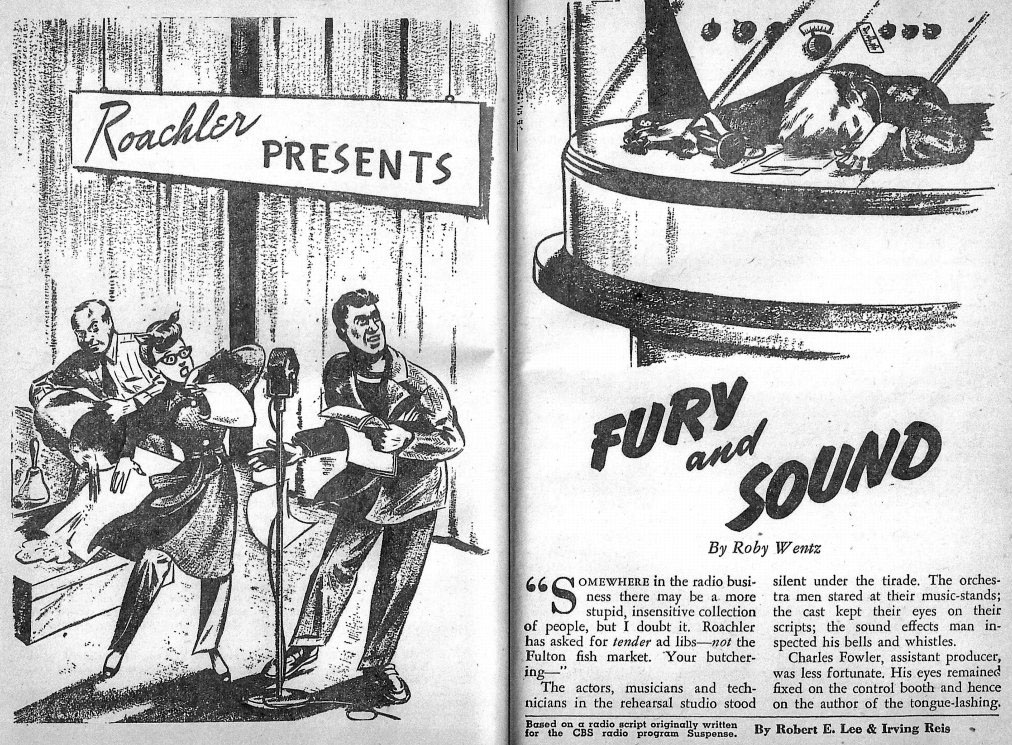Suspense (partially found anthology radio drama; 1942-1962)
An illustration from Suspense Magazine based on the lost episode Fury and Sound.
Status: Partially Found
Suspense was a radio drama that ran from 1942 to 1962. It became massively popular, amassing hundreds of episodes. Due to the hard work of archivists, a vast majority of Suspense episodes have been found and made available online, but — despite the show's popularity — some episodes have gone missing.[1]
Background
Suspense was a show that encompassed a number of genres. Most commonly, episodes fell into the categories of crime drama, mystery, or supernatural thriller. The show was also an anthology, featuring a rotating cast of characters and voice actors. Notable guest stars include Lucille Ball, Orson Welles, and Ronald Reagan.
During the show's more than twenty-year run (June 17th, 1942 — September 30th, 1962), it accumulated approximately 950 episodes. A small number of these broadcasts have evidently never surfaced online.
Missing Content
Some of the missing Suspense broadcasts include stories that were performed more than one time. Among collectors, these airings are given lower priority than lost episodes that were only performed once.
The following list is of lost Suspense episodes that were only performed and aired once.
| Y/M/D | Title | Notes |
|---|---|---|
| 42/7/1 | Life of Nellie James | Script reportedly acquired. |
| 42/7/8 | Rope | Script reportedly acquired. |
| 42/7/15 | Westbound Limited | Script reportedly acquired. |
| 43/2/9 | The Hangman Won't Wait | First half of show exists, and script acquired.[2] |
| 43/2/23 | Will You Walk into My Parlor? | First half of show exists, and script reportedly acquired. |
| 43/3/9 | The Phantom Archer | Script reportedly acquired. |
| 43/7/26 | Fury and Sound | AFRS transcription sold on eBay, and script acquired.[3] |
| 46/2/28 | The Keenest Edge | Script acquired.[4] |
| 48/7/8 | The Last Chance | Script reportedly acquired. |
| 50/6/15 | Deadline | Script reportedly acquired. |
| 51/11/12 | Mission of the Betta | Script reportedly acquired. |
| 51/11/19 | The Embezzler | Script acquired[5] |
| 56/1/3 | The Eavesdropper | Script reportedly acquired. |
| 56/8/1 | Massacre at Little Big Horn | Script cover page reportedly acquired. |
The dates, titles, and notes featured above were based on lists compiled by Dr. Joseph Webb.[6] Webb has also created a digital spreadsheet detailing all of the missing recordings for the series, including episodes that were reperformed.[7]
Additional Notes
- A number of episodes (such as "Fresh Air, Sunshine, and Murder" (May 24th, 1951), "Trials of Thomas Shaw" (November 5, 1951), and "Misfortune in Pearls" (November 26th, 1951)) were initially thought to be lost one-offs, but they were actually reperformed under different titles at later dates. Respectively, they became: "Rub Down & Out" (July 6th, 1958), "Once a Murderer" (November 15, 1955), and "End of the String" (January 17th, 1956).
- At one time, "Third Eye" was thought to be a lost episode, but no episode by this title was ever aired. The episode was actually called "Finishing School" and was never lost.
Whereabouts
According to Dr. Joseph Webb, the lost episodes from the summer of 1942 may no longer exist. During the summer of 1942, the show was produced in New York, and New York's system for archiving radio was far worse than Hollywood's. Consequently, the lost 1942 broadcasts may have been destroyed. It's also possible that they were simply never recorded.
Many of the episodes produced in California were archived through the Armed Forces Radio Service (AFRS, later becoming AFRTS to include television). This program recorded broadcasts, stored episodes on discs, and distributed copies of them. As a result, AFRS transcriptions of Suspense have shown up in numerous places around the world. The lost episode "Fury and Sound" was confirmed to exist in AFRS format when it showed up on eBay, but this disc was purchased by a private collector.
Lastly, it's possible that home recordings for any of the lost episodes could exist. Though, the process of home recording was somewhat expensive at the time, making the practice relatively uncommon.
External Links
References
- ↑ An Archive.org page on "Suspense - Single Episodes" by Old Time Radio Researchers Group. Retrieved 01 Jan '19
- ↑ A recreation of the episode "The Hangman Won't Wait" on the American Radio Theater. Retrieved 24 May '19
- ↑ A recreation of the episode "Fury And Sound" on Soundcloud. Retrieved 01 Jan '19
- ↑ A recreation of the episode "The Keenest Edge" on the American Radio Theater. Retrieved 24 May '19
- ↑ A recreation of the episode "The Embezzler" on the American Radio Theater. Retrieved 24 May '19
- ↑ An Amazon listing for The Suspense Collector’s Companion (2019 edition), by Joseph W. Webb, Ph.D. Retrieved 01 Jan '19
- ↑ A Google spreadsheet for AFRS Suspense Disc Numbers by Dr. Joseph Webb. Retrieved 01 Jan '19
